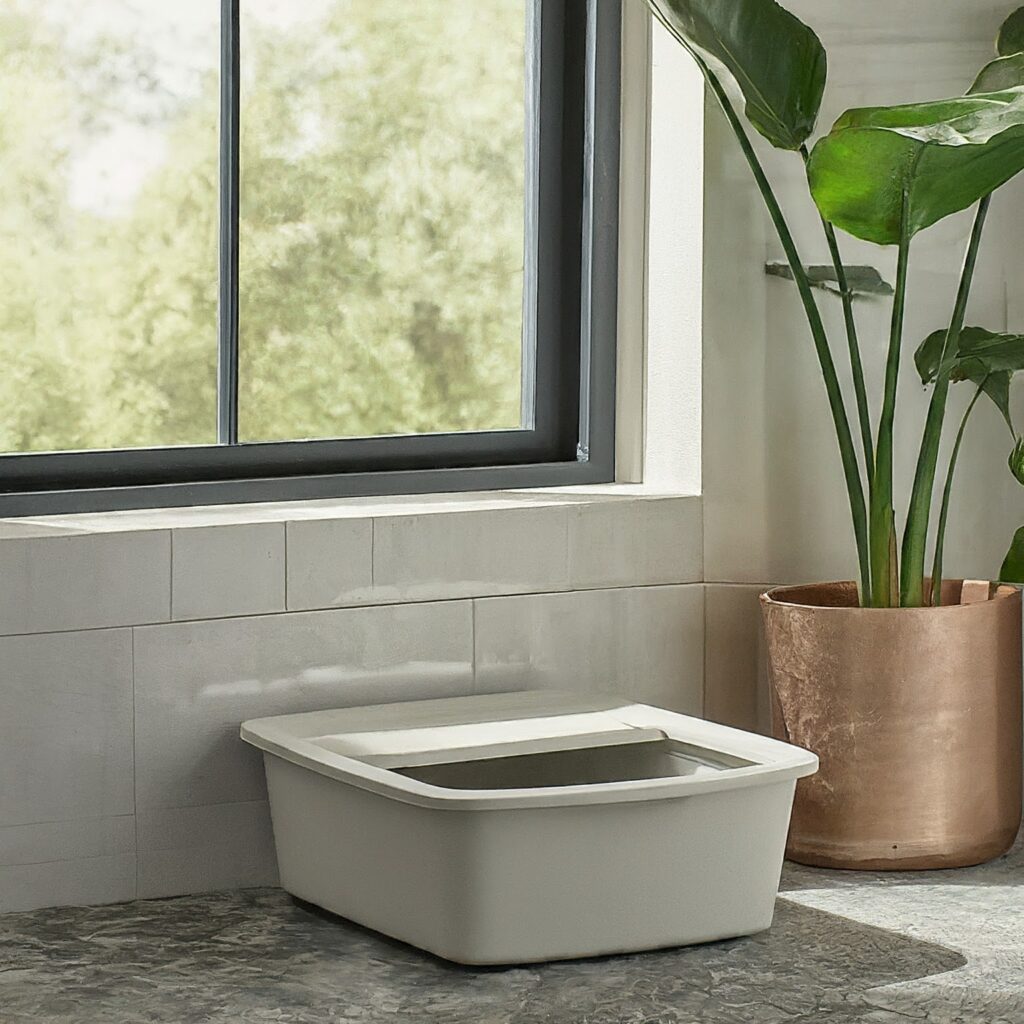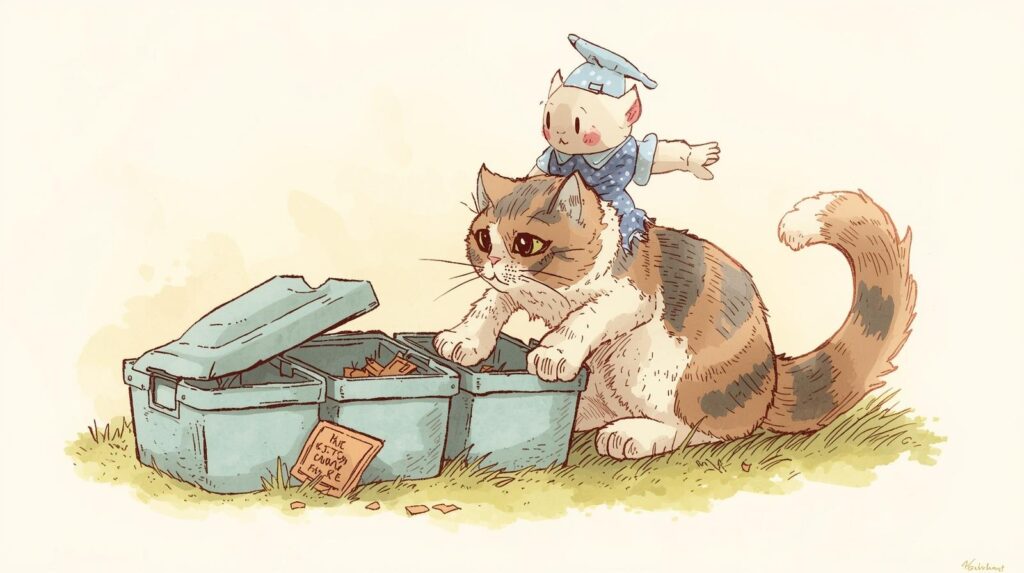
If you’ve been randomly placing dishes on the kitchen floor, it’s time to rethink your setup. This guide reveals the top rules for where to put cat food and water bowls, what common mistakes to avoid, and how to build the ideal feeding environment your cat enjoys. Cats are famously particular, especially about their eating habits. Surprisingly, the way you position their food and water bowls affects everything from digestive health to hydration, behaviour, and even litter box usage.
Tips and tricks to Get Started:
- Use multiple water bowls around the home—this encourages hydration
- Choose a semi-private corner—cats love calm, cosy spaces to eat
- Avoid plastic bowls—use ceramic or stainless steel to prevent bacteria buildup
Table of Contents
Quick Answer: Where to Put Cat Food and Water Bowls
The best place to put your cat’s food and water bowls is:
- In a quiet, low-traffic zone
- At least 5–10 feet away from the litter box
- With water and food placed separately
- On non-slip, washable surfaces
Following these basic rules reduces anxiety, increases hydration, and encourages healthier eating patterns.
Best Places to Choose Where to Put Cat Food and Water Bowls at Home

The environment around a cat’s food can either make them feel safe or stressed. That’s why selecting the right location is the first step in optimising where to put cat food and water bowls.
Why it matters:
- Cats are solitary hunters and prefer to eat without distractions.
- Loud appliances or busy walkways can cause anxiety, making cats eat less.
- A dirty or cluttered area may discourage them from using the space.
Ideal placement guidelines:
- Set bowls in quiet corners away from windows and loud machines.
- Avoid hallways, entryways, or spots near children and pets.
- Keep the area well-lit, but not under direct heat or harsh sunlight.
Bonus Tip:
If you live in a multi-pet household, consider using baby gates or a dedicated feeding nook to give your cat privacy.
Why Separating Food and Water Bowls Matters in Where to Put Cat Food and Water Bowls
Many cat owners place food and water bowls side by side without thinking twice—but this setup can actually discourage your cat from drinking enough water. In fact, one of the most searched topics in 2025 related to where to put cat food and water bowls is:
Should cat water and food bowls be together?
The short answer? No. And here’s why:
1.Instinct from the Wild
In nature, cats avoid water sources near their prey. They instinctively believe that water near food might be contaminated by bacteria or spoiled meat. This behavior continues in domesticated cats—even though their food is clean.
Water near food = “unsafe” in cat psychology
Can lead to reduced water intake
2.Decreased Hydration = Health Risks
Cats are naturally low-thirst animals, and they get most of their moisture from their food. When they skip drinking water, the consequences can be serious:
Urinary tract infections
Kidney disease
Bladder stones/crystals
Separating food and water bowls encourages more drinking, which directly reduces these risks.
3.Scientific Backing
Veterinary studies confirm that cats drink more often when their water is in a different location than their food. It’s not just instinct—it’s biology.
A 2025 study by the Feline Behavior Science Institute showed:
Cats consumed 30% more water when bowls were placed in separate areas versus side-by-side.
That’s a major health boost—especially for senior cats or those prone to UTIs.
4. Best Practices to Separate Food and Water Bowls
When deciding where to put cat food and water bowls, consider these tested strategies:
Keep 3–5 feet of distance between food and water bowls
Place water bowls in multiple rooms (especially where the cat relaxes)
Use elevated water fountains in calm zones—cats prefer flowing water
5. Bonus Tip: Let Your Cat Choose
Set up two or more water bowls in different locations—one near the food, one farther away. Track which one your cat drinks from more often. You’ll see clear preference for separated water bowls in most cases.
Never Place Bowls Near Litter – A Must for Where to Put Cat Food and Water Bowls
Would you want to eat next to your toilet? Neither does your cat.
Unfortunately, this is a common mistake and one your competitor didn’t fully address. Where to put cat food and water bowls must never be near the litter box due to:
Risks of close proximity:
Smell and bacteria contaminating food and water
Cats refusing to eat, drink, or use the litter box
Increased stress and even urinary health problems
How far should bowls be?
At least 5–10 feet away, preferably in another room
Use doors, shelves, or tall furniture as barriers.
Use the Right Height & Surface
Cat bowl placement isn’t just about distance—height and surface type also affect posture, cleanliness, and comfort.
Best practices:
Choose raised bowls (2–4 inches) to ease pressure on the neck and joints
Use non-slip mats or silicone trays to keep bowls stable
Avoid placing bowls on uneven or carpeted surfaces (they trap bacteria)
Perfect for:
Senior cats with arthritis
Cats who eat too fast (you can even add slow-feed bowls on raised stands)
Homes with toddlers or dogs who may tip bowls over.
Select Safe, Hygienic Bowl Materials
The type of bowl you use matters more than you think.
Why plastic bowls are bad:
They scratch easily, trapping bacteria
They can cause cat chin acne .
They’re harder to keep clean over time.
Best bowl materials:
Stainless steel: Anti-microbial, dishwasher safe, long-lasting
Ceramic: Heavier, stylish, and good for water
Glass: Sleek and non-toxic, but breakable.
Wash bowls daily using unscented dish soap, and rinse thoroughly to avoid chemical residue.
In Multi-Cat Homes, Carefully Plan Where to Put Cat Food and Water Bowls
If you live with more than one cat, you can’t just toss down a few bowls and hope for the best. In fact, one of the most common search queries in 2025 is:
How do I feed multiple cats without fighting or bullying?
Cats are territorial animals. Feeding them too close together—or sharing bowls—can trigger stress, food aggression, and even serious health issues like under-eating or urinary problems.
That’s why understanding where to put cat food and water bowls in multi-cat homes is crucial to their happiness and your peace of mind.
1. Why Sharing Bowls Is a Mistake
Many cat owners unknowingly make the mistake of using one big bowl for multiple cats or grouping them all too close together.
But this can cause:
Food bullying (one cat scares the other away)
Stress-related vomiting or diarrheaCats eating too fast or too little
Cats drinking less water.
Cats naturally like to eat alone where they feel safe. When forced to compete, the shy cat may simply skip meals.
2. How Many Bowls Should You Have?
Follow the “1 per cat + 1 extra” rule for both food and water bowls:
2 cats = 3 food bowls
2 cats = 3 water bowls
This gives each cat a safe spot to eat or drink without feeling threatened.
Place bowls:
In different rooms, if space allows.
At different heights or corners in open-plan areas.
Far enough apart that they don’t see each other while eating.
Key insight: Eye contact during feeding = dominance challenge = stress.
3. Smart Layout Ideas for Multi-Cat Homes
Use feeding zones to reduce tension. Here’s how:
Zone Ideas:
One bowl in the kitchen, another in the laundry room, a third in a quiet hallway.
Use window shelves or cat trees to place food/water at varying heights.
Feed more dominant cats higher up, shy cats on floor level.
Clean & Quiet:
Keep each station clean and clutter-free.
Avoid high-traffic areas during feeding times.
4. What Behavior Tells You to Adjust?
Watch out for these warning signs that your current setup is stressing out your cats:
One cat waits until the other is done to eat.
One always eats more or guards the bowl.
One cat ignores water bowls.
Tension, swatting, or chasing during mealtime.
These signals mean it’s time to rethink where to put cat food and water bowls—especially in a multi-cat home.
5. Water Bowl Placement is Just as Critical
Most cat parents focus only on food—but water bowl positioning is just as important.
Tips:
Place separate water bowls in each cat’s comfort zone.
Use cat fountains for picky drinkers.
Avoid placing water bowls near food, litter, or noisy spots.
Hydration problems are common in multi-cat households—spreading out water bowls increases intake and reduces competition.
You may also read:
Watch Your Cat’s Behavior & Adjust Accordingly
No blog or vet knows your cat better than you. That’s why observation is a key part of creating the best feeding zone.
Signs your cat may not like current bowl placement:
Hesitates before eating or drinking.
Spills food or flips bowls.
Avoids water or drinks less.
What to try:
Change location to a quieter area.
Offer multiple water stations to see which your cat prefers.
Try elevated or angled bowls to improve comfort.
Further reading:
FAQs – Where to Put Cat Food and Water Bowls
Q1. Should cat food and water bowls be next to each other?
No, cats prefer separation. Keep them at least 3 feet apart for better hydration and comfort.
Q2. Can I put the bowls near the litter box?
Avoid this. It’s unsanitary and stressful for cats. Aim for separate rooms if possible.
Q3. Where is the best place to put cat water bowls?
A quiet, open area away from food and litter. Bonus: try cat water fountains to boost drinking to boost drinking.
Q4. How many bowls should I have for two cats?
At least 2 food + 2 water bowls, ideally more. Place in different spots to prevent bullying.
Q5. What kind of bowls are best for cats?
Stainless steel or ceramic bowls are best. They’re easy to clean and safe for long-term use.
Q6. Can I elevate my cat’s bowls?
Yes! Especially for older cats. Elevated bowls reduce neck strain and improve posture.
Q7. How often should I clean food and water bowls?
Daily. Wash with soap and rinse thoroughly. Change water twice a day.
Q8. What surfaces are best under cat bowls?
Use non-slip mats or trays. This keeps floors clean and prevents bowl sliding.
Wrapping up:– Where to Put Cat Food and Water Bowls Matters!
Your cat’s feeding zone is more than a corner on the floor—it’s a daily experience that affects their health, happiness, and hydration.
By placing bowls in quiet, clean, and well-separated zones, you create a safe and stress-free environment. Most importantly, watch your cat’s signals—and adjust based on what works for them.
So, next time you set down that food dish, remember: where to put cat food and water bowls could be the key to your cat’s comfort and wellness.


